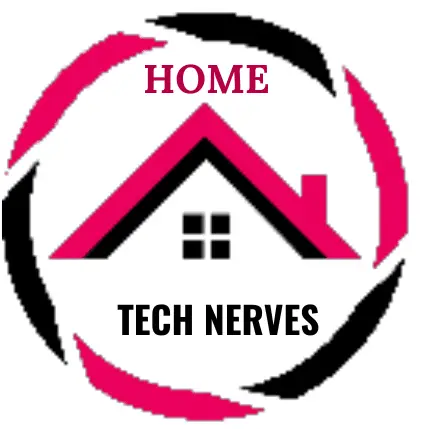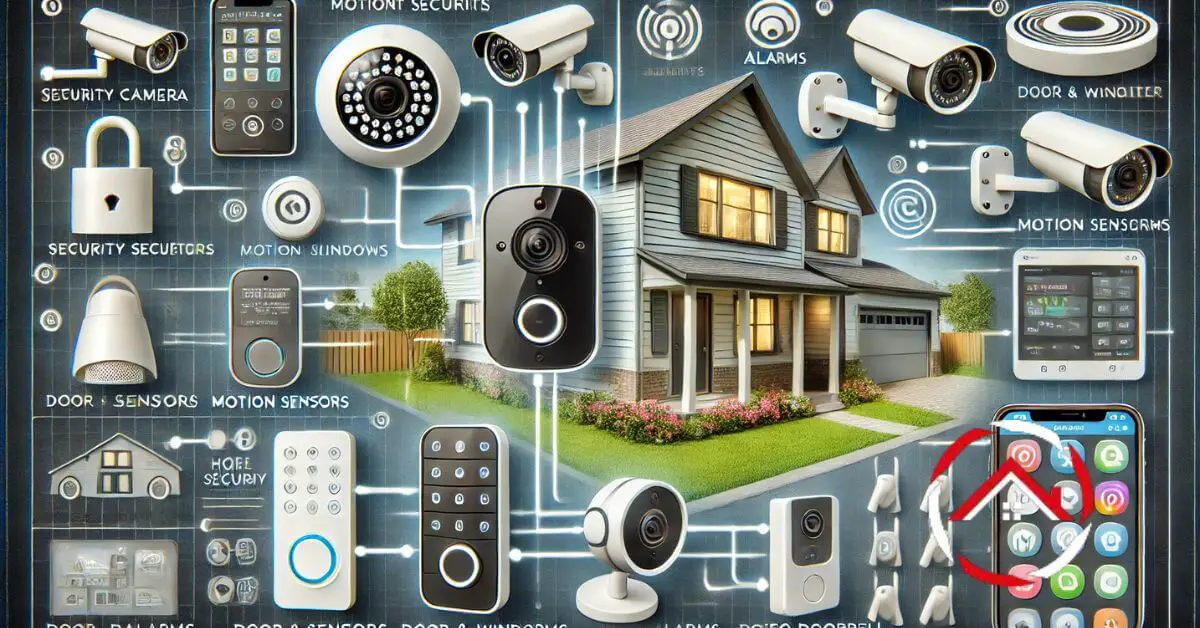A good home security system offers more than just peace of mind. It protects your loved ones, property, and valuables from intruders.
With advanced features like motion sensors, cameras, and alarms, you can stay informed of any unusual activity.
Smart systems even allow you to monitor your home remotely via your smartphone.
Plus, integration with home automation lets you control lights and locks for added security.
The right system provides 24/7 protection, so you can sleep soundly knowing your home is secure.
Discover the essential home security system features every modern home security system should have to keep your family safe.
Read more: Home Security Systems
Table of Contents
Best Home Security System Features To Look For
When choosing a home security system, it’s crucial to focus on features that ensure maximum safety and convenience.
From cameras to automation, these essential components work together to protect your home and family effectively.
24/7 Monitoring
A reliable security system offers 24/7 monitoring, ensuring your home is always protected.
Whether you’re at home or away, professional monitoring services can alert authorities in case of a break-in, fire, or medical emergency.
This feature provides real-time support, so you’re not alone when something goes wrong.
The constant surveillance ensures a quick response, giving you peace of mind no matter where you are.
Motion Sensors
Motion sensors are a critical part of any security system. They detect movement in and around your home, triggering alarms when unexpected activity occurs.
Placing sensors near windows, doors, and high-traffic areas increases their effectiveness.
Some advanced systems can distinguish between pets and human movement, reducing false alarms.
This feature is vital for keeping intruders at bay and maintaining home security while you’re away.
Security Cameras
Cameras provide an extra layer of protection by capturing live footage around your property.
Indoor and outdoor security cameras allow you to monitor activity in real time, and many come with night vision and HD resolution for clear images, even in low light.
Additionally, smartphone integration lets you view live feeds remotely, ensuring you stay informed of any unusual activity at all times.
Read more: Top Home Security Cameras
Smart Home Integration
Smart home integration enables your security system to work seamlessly with other devices like smart lights, thermostats, and locks.
This feature lets you automate certain tasks, such as turning on lights when motion is detected or locking doors remotely.
Smart integration enhances convenience and security, giving you full control of your home’s safety from anywhere.
Read more: Best Smart Home Security Systems
Alarms And Sirens
Loud alarms and sirens are a powerful deterrent against intruders. When triggered, these devices immediately alert anyone nearby of potential danger.
Most systems allow you to customize the alarm volume and duration, ensuring it fits your needs.
Sirens can also be linked to other security features like cameras or motion sensors, creating a comprehensive security network that instantly responds to threats.
Mobile App Control
A mobile app allows you to control your security system remotely from your smartphone.
Whether you’re checking camera footage, arming the system, or getting alerts, a mobile app makes managing your home security easier.
This feature gives you full access to real-time updates and system controls, no matter where you are. It’s an essential tool for modern, smart home security systems.
Battery Backup
A good home security system includes a battery backup to ensure your protection during power outages.
This feature keeps your alarms, cameras, and other devices running, even when the electricity is out.
Battery backup provides continuous security and prevents system failure when you need it most.
It’s a crucial aspect of maintaining reliable home protection during unexpected events.
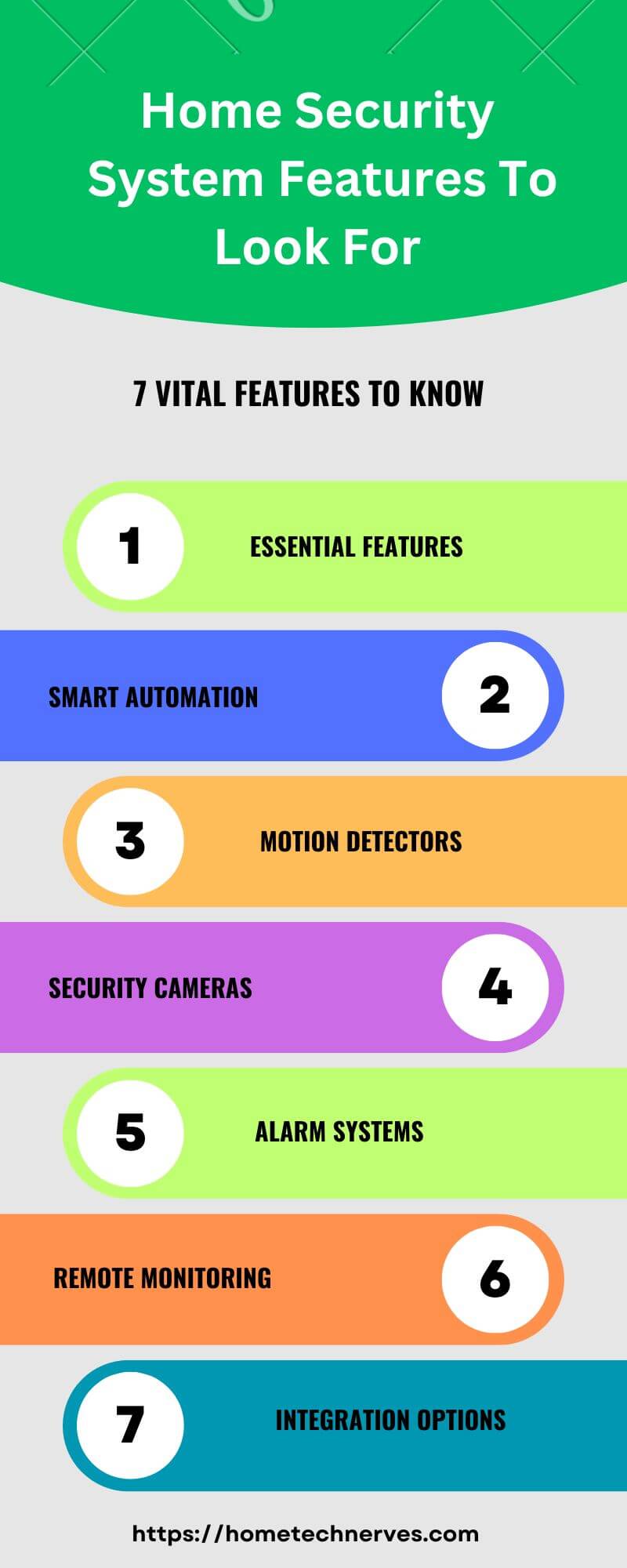
DIY Home Security System Features To Look For
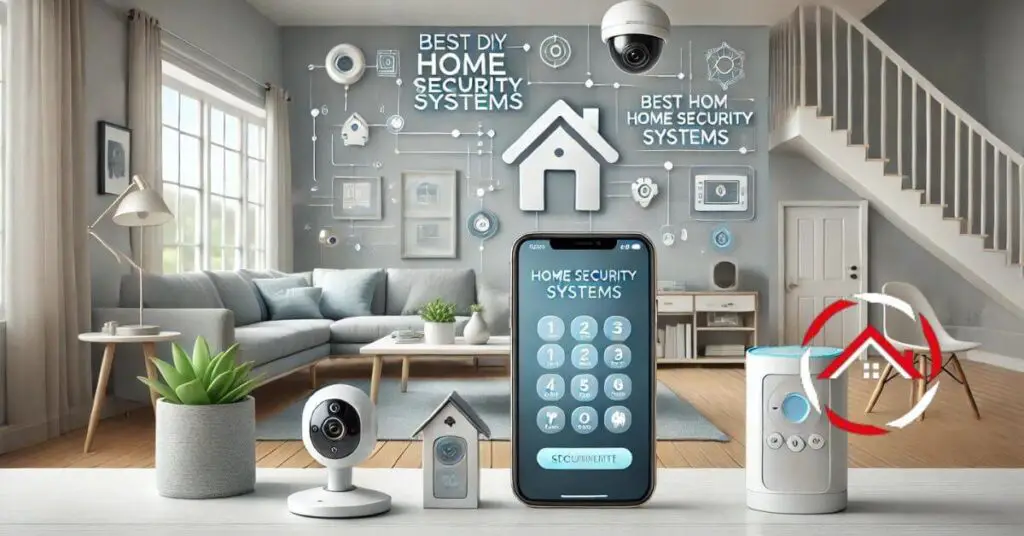
A DIY home security system is perfect for those who want to take control of their home’s protection without the hassle of professional installation.
With user-friendly setups and customizable options, these systems offer flexibility and convenience for modern homeowners.
Easy Installation
A DIY home security system should be simple to install, allowing you to set it up without professional help.
Key features include:
- Wireless setup: No need for complicated wiring.
- Plug-and-play devices: Ready to use straight out of the box.
- Step-by-step instructions: Ensures hassle-free installation.
Read more: How to Install a Home Security System
Customizable Security Packages
One of the major advantages of DIY systems is the ability to customize based on your home’s needs.
Look for features like:
- Modular components: Add cameras, sensors, or alarms as needed.
- Scalable systems: Upgrade or downgrade anytime.
- Personalized monitoring: Choose between self-monitoring or professional services.
Wireless Connectivity
Wireless technology makes DIY systems easy to manage and maintain.
Essential wireless features:
- Wi-Fi enabled: Connects to your home network for remote access.
- No drilling required: Ideal for renters or non-permanent setups.
- Smartphone control: Manage your system from anywhere.
Smart Home Integration
Your DIY security system should work with other smart home devices for added convenience.
Important integration features:
- Voice control compatibility: Works with Google Assistant or Alexa.
- Smart locks and lights: Automate home security tasks.
- App integration: Connects with home automation apps for unified control.
Self-Monitoring
Many DIY systems offer the option for self-monitoring, allowing you to stay informed without a monthly fee.
Key self-monitoring benefits:
- Instant alerts: Receive notifications on your smartphone.
- Live video feeds: View real-time footage from your cameras.
- Cost-effective: Avoid ongoing subscription fees.
Affordable Pricing
DIY home security systems are known for their budget-friendly options.
What to expect:
- No installation fees: You save by doing it yourself.
- Flexible pricing: Choose only the features you need.
- No long-term contracts: Pay as you go, with no strings attached.
Read more: Best Affordable Home Security Systems
Battery Backup
Power outages won’t leave your home unprotected if your system includes battery backup.
Look for systems with:
- Long-lasting battery life: Keeps your system running during outages.
- Rechargeable options: Easy to maintain over time.
- Seamless transition: Automatically switches to battery power when needed.
Wireless Home Security System Features To Look For
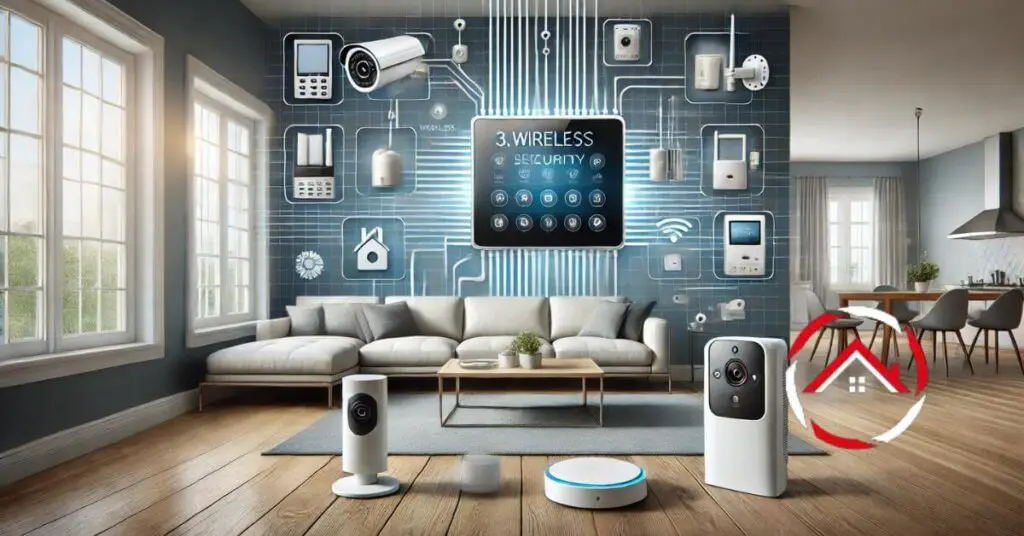
Wireless home security systems offer flexibility, easy installation, and modern technology to keep your home safe without the need for extensive wiring.
They are ideal for renters and homeowners looking for a sleek, hassle-free solution to home security.
Simple Installation
Wireless systems are designed to be quick and easy to install.
Key features include:
- No drilling required: Perfect for renters or homes where permanent fixtures aren’t desired.
- Plug-and-play components: Devices are ready to use out of the box.
- Self-installation: No need to hire professional installers.
Remote Access
Remote access is a core feature of wireless systems, allowing you to manage security from anywhere.
Important remote access features:
- Smartphone app control: Monitor your home and control your system on the go.
- Real-time alerts: Receive instant notifications of any activity.
- Remote arming/disarming: Secure your home from anywhere.
Battery-Powered Devices
Since wireless systems don’t rely on power lines, battery-powered devices are a must.
Battery features to look for:
- Long-lasting batteries: Ensure continuous operation for months.
- Low-battery alerts: Get notified when it’s time to change or recharge.
- Backup battery options: Keeps your system running during power outages.
Wireless Cameras
Wireless cameras enhance home security by providing real-time footage without the hassle of wires.
Top camera features include:
- High-definition video: Clear footage for accurate monitoring.
- Night vision: See clearly even in low light or total darkness.
- Motion detection: Automatically record when movement is detected.
Smart Home Integration
Your wireless security system should work seamlessly with other smart devices in your home.
Key integration features:
- Voice assistant compatibility: Control with Alexa, Google Assistant, or Siri.
- Smart locks and lights: Automate security functions like locking doors or turning on lights.
- Smartphone integration: Manage all connected devices from one app.
Read more: Alexa-Compatible Home Security Systems
No Monthly Contracts
Many wireless systems offer affordable, contract-free options.
Benefits of no contracts:
- Flexible monitoring plans: Choose self-monitoring or opt for professional services without long-term commitments.
- Cost savings: Pay only for the features you need.
- Cancel anytime: Freedom to switch providers or monitoring services as needed.
Secure Wireless Connections
A reliable wireless system depends on secure and stable connectivity.
Important wireless security features:
- Encrypted data transmission: Protects your system from hacking and interference.
- Dual-band Wi-Fi: Provides a more stable connection with less interference.
- Cellular backup: Ensures your system remains active if Wi-Fi goes down.
Read more: Best Wireless Home Security Systems
Wrap Up
A good home security system gives you peace of mind and keeps your family safe.
By choosing the right features like cameras, motion sensors, and 24/7 monitoring, you can protect your home from potential threats.
Smart integration and remote access make managing your security simple and convenient.
Whether you opt for a DIY or professional setup, these features ensure your home stays secure at all times.
Don’t wait until it’s too late—explore your options today and safeguard what matters most.
Take the next step and choose a home security system that fits your needs.
Frequently Asked Questions
What features should a home security system have?
A home security system should include key features like motion detectors, security cameras, door/window sensors, alarms, and smart automation. Some systems also offer remote monitoring, smartphone control, and integration with other smart devices to enhance convenience and security.
How do smart home security systems work?
Smart home security systems use Wi-Fi-enabled devices like cameras, motion sensors, and alarms. These systems send real-time alerts to your smartphone, allowing you to monitor and control your home’s security remotely, providing enhanced protection and convenience.
Are wireless home security systems reliable?
Yes, wireless home security systems are reliable. They offer flexibility, easy installation, and remote access through smartphones. However, they depend on a stable internet connection and battery life. Backup power and cellular connections can ensure functionality during outages or weak internet.
What is the most important feature of a security system?
The most important feature of a security system is its ability to detect unauthorized entry and immediately alert homeowners or authorities. This typically involves a combination of door/window sensors, motion detectors, and alarms to ensure quick responses and enhanced protection.
